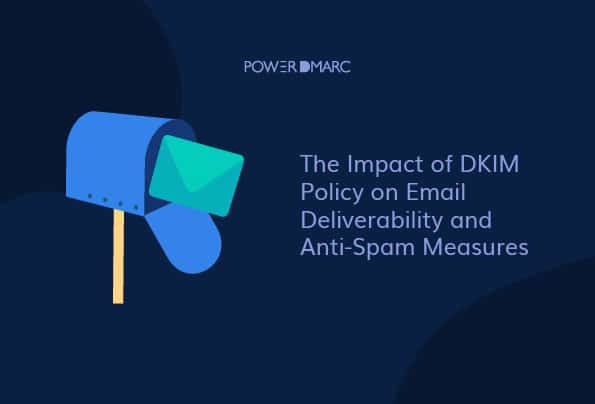Setting a DKIM policy ensures all legitimate emails land in desired recipients’ inboxes without being modified by attackers and impersonators during the delivery process.
Email deliverability is crucial to marketing and PR campaigns, communication with customers and stakeholders, etc. Bounce rates, open rates, unsubscribe rates, click-through rates, and spam complaints help the marketing team get an idea of how people are engaging with their email content. Observing and assessing these metrics for a definite period of time reveals trends in audience activity and engagement.
Email Authentication: Securing Email Communications for Businesses
Email authentication is the process of verifying the authenticity of an email message to ensure that it is not forged or manipulated by spammers, phishers, or other malicious actors. There are several methods of email authentication, but the most commonly used ones are SPF, DKIM, and DMARC.
By using these authentication methods, email servers can ensure that incoming email messages are legitimate and prevent spam and phishing attacks. It is important to note that email authentication is not foolproof, and attackers can still find ways to bypass these measures. Therefore, it is always a good idea to be cautious when opening email messages, especially those that contain links or attachments.
DKIM (DomainKeys Identified Mail): DKIM is an email authentication method that uses public-key cryptography to verify the authenticity of an email message. With DKIM, the sender signs the message using a private key, and the recipient verifies the signature using a public key that is published in the DNS records. This process ensures that the message has not been tampered with during transit and that the sender is who they claim to be.
Setting up an appropriate DKIM policy prevents emails from being altered in transit, preserving the original message contents through the delivery process.
Email Deliverability and Its Importance
Email deliverability is the ability of an email to land in a recipient’s inbox instead of getting marked as spam or bouncing back. In terms of delivery, all the major email service providers share a reason why an email was rejected (bounced back), based on what the recipient’s server shares back in the error message.
Here’s why email deliverability is crucial to marketers-
Reaching the Desired Recipients’ Inboxes is the First Step
With so many active brands across niches, there’s increased competition in getting space in your target audiences’ mailboxes. The fast-evolving market standards and mailbox providers’ changing parameters are leaving low margins for brands that invest their time, efforts, and expertise in designing campaigns.
This means businesses are striving for high opening rates, click-through rates, and conversion percentages, which is possible only when emails land in the inboxes. If recipients aren’t seeing your messages, there’s no way they will engage with the content you created with so much effort and creativity.
Improved Deliverability Rate Avoids Wasted Investment in Email Marketing
It’s frustrating to realize that your emails are going to the spam folder or you’re blocked by a particular mailbox provider or Spamhaus has listed you! This not only affects the engagement rate but also consumes the time that goes into mitigating these issues with mailbox providers. Your customer service will be in question if support emails aren’t exchanged properly. You may need to invest in a specialist to overcome critical deliverability issues.
Better Engagement and Higher ROI
Lately, mailbox providers have started focusing on user engagement. They monitor metrics like opens, clicks, and replies along with user complaints, unsubscribe rates, unopen rates, deleting messages without opening, and no engagement, etc. They are streamlining all filters into ensuring recipients receive only value-adding and read-worthy emails.
How DKIM Operates
DKIM is an email authentication protocol that adds a digital signature to the email header which is secured with encryption. When you create a DKIM record, and add it to your DNS, a pair of public and private keys is issued to you. The private is secretly stored with the domain owner and the public key is openly accessible by recipients’ mail servers. Both these keys are matched; when the match is successful, the DKIM check passes, otherwise, it fails.
How Does DKIM Policy Improve Email Deliverability and Reduce Spam?
DKIM policy isn’t the only measure you need to take to improve email deliverability, but it’s a crucial one. It also helps in DMARC compliance which helps you stay abreast of phishing emails sent using your domain name. DKIM lets email service providers know you’re a legitimate and authorized email sender as a digital signature is affixed in the header.
Implementing DKIM protects your domain against spoofing which shields outgoing emails from being perceived as spam by recipients’ mailboxes. In a spoofing attack, hackers forge the From address, but DKIM can detect if an email has been modified or altered in any form, including unauthorized changes made to the From address. Learn more about how email authentication improves email deliverability rate.
Final Thoughts
Can DKIM policy improve email deliverability? Well, yes, it handles a lot of heavy lifting that goes into email authentication. However, you must comply with SPF and DMARC in addition to DKIM to strongly combat phishing attempts. SPF works by asking you to submit a list of IP addresses allowed to send emails using your domain. DMARC works by requiring you to choose how recipients’ mailboxes should treat messages failing SPF and/or DKIM authentication checks. You can choose to take no action, mark them as spam, or completely reject their entry.
- Rise in Tax Scams and IRS Email Impersonation Attacks During Tax Season - May 2, 2024
- Email Safety 101 to Fight Crypto Scams - April 30, 2024
- How to Find the Best DMARC Solution Provider for Your Business? - April 25, 2024
